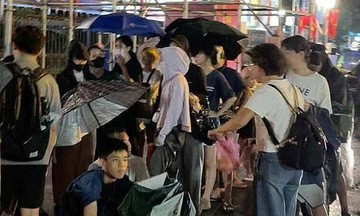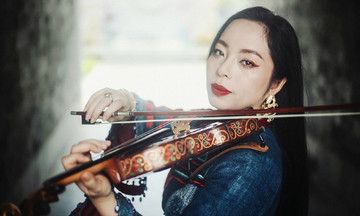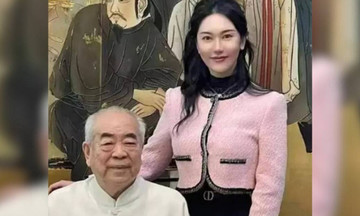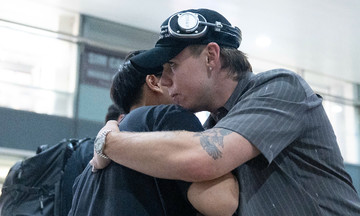According to the Guardian, voice actors in many countries are facing the threat of job displacement due to AI, a profession that has brought them recognition. On 3/7, the news site interviewed artists and union leaders amidst the global rise of AI.
In Germany, many voice actors say the increasing use of AI in films threatens their careers, with their voices being used without permission to train AI models. Germany is renowned for the German Prize for Dubbing, considered the Oscar of the voice acting industry, which honors outstanding talent annually.
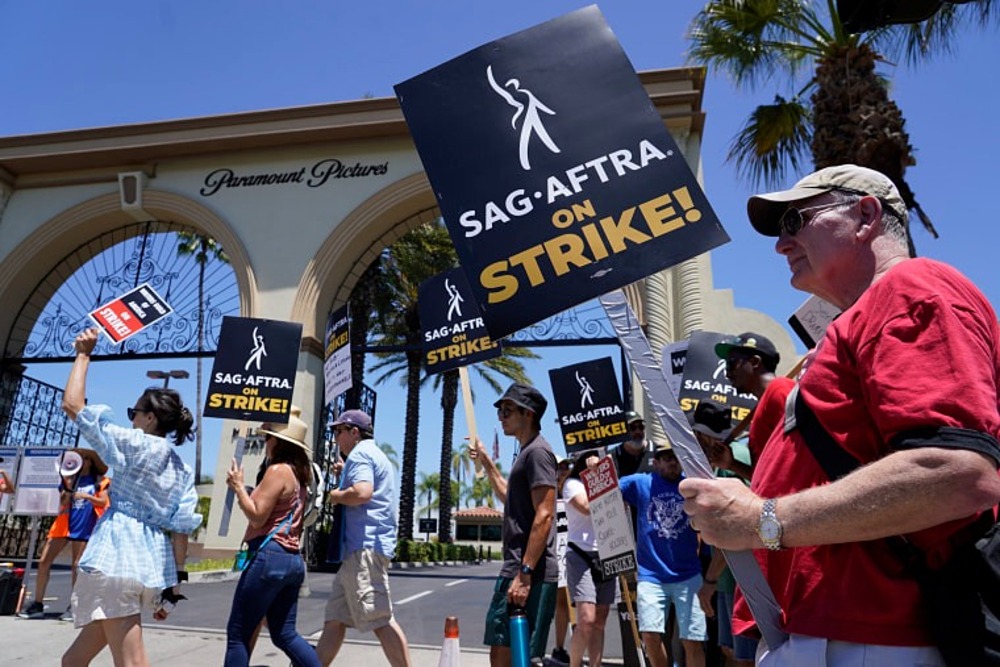 |
Writers and actors of SAG-AFTRA (Screen Actors Guild‐American Federation of Television and Radio Artists) picket outside Paramount Pictures in 2023. Photo: AP |
In France, Voice Off, the French professional voice actors' association, is collaborating with the French Union of Performing Artists to organize the #TouchePasMaVF (Don't Touch My French Version) movement. They are urging the government to include voice acting in l’exception culturelle, a policy designating cultural products as part of national identity requiring special state protection.
Patrick Kuban, a member of Voice Off, declared this their "fight" against AI. He believes voice acting isn't just about translating a film into the local language, but adapting the content to suit "French humor, details familiar to the audience, culture, and emotions."
The campaign emerged after Audiens Group published research showing AI threatened about 12,500 jobs in France in 2023, including screenwriters, translators, sound engineers, and voice actors.
Tim Friedlander, president of the American voice actors’ association, argues that only humans can convey life experiences, vulnerabilities, emotions, contexts, backgrounds, and relationships into a role. “These are things that are inherent in us. You can create a voice that sounds angry. But if you can’t portray the rage, you won’t feel the connection,” Friedlander added.
The use of AI in the film industry was a focal point of the Hollywood strike, with both American screenwriters and actors concerned that technology could undermine their roles. Shortly after, over 20 voice acting federations and organizations formed the United Voice Artists alliance with the slogan: "Don't steal our voices."
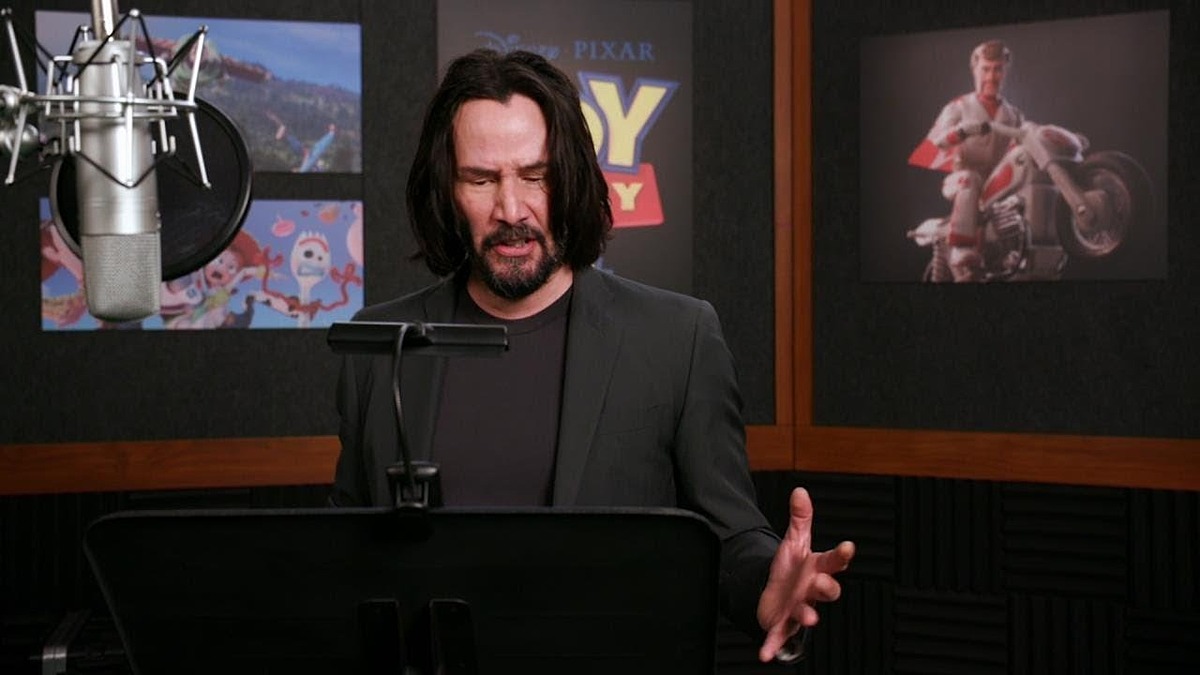 |
Keanu Reeves voices Duke Caboom in "Toy Story 4" (2019). Photo: The Canadian Press |
Since the advent of talking pictures in the late 1920s, the voice acting industry has grown into a global industry worth 4.04 billion USD. In Europe, 61% of German and 54% of French viewers choose dubbed films. Disney has also expanded its translation languages to over 26. But with the development of AI, the Guardian poses the question: Who benefits when voice acting methods could soon be changed?
Earlier this year, the UK startup EvenLabs announced plans to replicate the voice of French actor Alain Dorval (1946-2024) for Amazon's Armor project. Dorval voiced many roles for American actor Sylvester Stallone in around 30 films since the 1970s. They could do this because many past contracts didn't stipulate the reuse of voices to train AI software to create synthetic recordings that could replace real people.
Patrick Kuban described this situation as "a kind of monster." He said, “If we don’t have protections, every job will disappear: after cinema will come journalism, music, and all the cultural industries. A society without culture is nothing good.”
Tim Friedlander noted that when ChatGPT and EvenLabs launched in 2022 and made AI mainstream, artificial intelligence was only a theoretical threat, not directly harmful. But as the market grew, leading to the emergence of the Israeli startup Deepdub, which provides AI-powered film dubbing services, the issues surrounding voice synthesis became "impossible to ignore."
Daniele Giuliani, the Italian voice of Jon Snow in Game of Thrones and president of the Italian voice acting association Itakly (ANAD), said that AI stealing an artist's voice is like stealing their identity. He recently campaigned for anti-AI clauses in national labor contracts. His goal is to protect voice actors from unauthorized and indiscriminate use of their voices, prohibiting tech companies from using existing voices to train machine learning models and exploit deep data mining.
In India, 72% of viewers prefer content in other languages. Sanket Mhatre, who dubbed Ryan Reynolds' Hal Jordan in Green Lantern (2011), expressed concern about the AI issue: “We’ve been signing contracts for years, most of which have broad clauses allowing our voices to be used in perpetuity anywhere in the world. Now with AI, signing such clauses is like signing away our careers.”
Sanket Mhatre dubs around 100 Hollywood films into Hindi each year. He also contributes to Chinese, Spanish, and French films in various genres, including web series, animation, anime, documentaries, and audiobooks. “Every day, I retell stories from across the globe to my countrymen in their language, in my voice,” he added.
Despite concerns about AI development, Mhatre believes his job is still secure. He argues AI can't yet handle subtle cultural and emotional nuances. “If the actor's face isn't on screen, just their back, we can add a line or an expression in our voice to clarify the scene,” he explained. He gave the example of replacing an original title with a Bollywood work in a science fiction film's time travel sequence to make it more accessible to domestic audiences.
However, Mhatre acknowledges using AI is much faster and cheaper than hiring a team of voice actors, translators, and sound engineers. “We need to stand up against the robots. We need AI in peace missions like combating climate change, but we need real actors on screen.”
Phuong Thao (via the Guardian)



